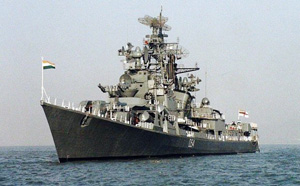Mumbai, August 16: Terming military might as the biggest deterrent to war, Prime Minister Narendra Modi today said the defence forces will be modernised to ensure that "nobody casts an evil eye" on the nation.
"Fighting a war and winning it has now become less difficult these days. But a modern military, armed with state of the arm weaponry alone is a guarantee against war. When we are capable, no one can dare challenge us," Modi said addressing a gathering after dedicating the largest indigenously built warship INS Kolkata to the nation.
"When people have a sense of our military capability, nobody will ever dare to cast an evil eye on our nation," he said.
Stressing the importance of maritime security in fast expanding global trade and commerce, the Prime Minister said India, with its vast coastline, was playing a major role in it.
"In the coming days, INS Kolkata will inspire confidence to those involved in maritime trade," he said.
Describing the building of the destroyer ship as a big achievement by India's technicians, engineers and defence experts, Modi said the government was committed to modernising the defence forces so "our jawans don't feel they are lagging behind in defending our nation.
"When I dedicate INS Kolkata to the nation, I am confident it will boost our military prowess and give confidence to our soldiers." Defence Minister Arun Jaitley and Chief of the Naval Staff Admiral RK Dhowan were present at the ceremony held at the Naval dockyard.
The warship, constructed by the Mazagon Dockyards Limited, has been designed by Navy's design bureau. The 6,800 tonne warship is a technology demonstrator and will showcase a giant leap in shipbuilding technology in the country.
The Prime Minister had dedicated India's largest warship INS Vikramaditya to the nation in June in his first outing after taking charge. Modi said that the government has taken important decisions in its budget and has given priority to "defence upgrade".
Referring to the decision of allowing 49 per cent FDI in defence, Modi said, "We have to import (military hardware)... Because of this one decision, India can become self-reliant in this sector. Our youth will become innovative and a day will come when India will export in this sector."
INS Kolkata will be a part of the Kolkata Class destroyers of the Indian Navy which will include follow-on ships by the name of INS Kochi and INS Chennai respectively. The keel of the warship was laid down in September 2003 and the ship was launched in 2006. Its original commissioning was planned in 2010 but there were delays.
The ship had also suffered a mishap during the trial phase when a Navy officer lost his life during an incident in the fire-fighting equipment of the vessel.
The Prime Minister, on his day long visit to Maharashtra, will also lay the foundation for a multi-crore SEZ and port connectivity project in Navi Mumbai, dedicate a Powergrid's transmission line and launch multiple road and highway projects in Solapur.
Regarded as the most potent warship to have been constructed in India yet, INS Kolkata measures 164 meters in length, approximately 18 meters in width and has a full load displacement of 7400 tonnes.
The ship has a Combined Gas and Gas (COGAG) propulsion system, consisting of four powerful reversible gas turbines and can attain speeds in excess of 30 knots, a defence release said.
The warship's electric power is provided by four gas turbine generators and one diesel alternator, which together produce 4.5 Mega-Watts of electrical power, enough to light up a small town. It has a complement of 30 officers and 300 sailors.






Comments
Add new comment